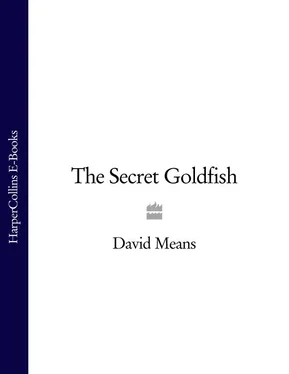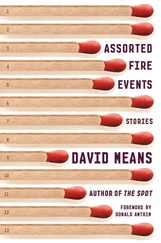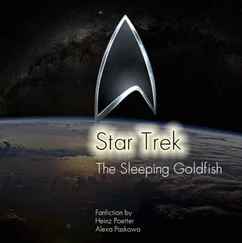David Means - The Secret Goldfish
Здесь есть возможность читать онлайн «David Means - The Secret Goldfish» — ознакомительный отрывок электронной книги совершенно бесплатно, а после прочтения отрывка купить полную версию. В некоторых случаях можно слушать аудио, скачать через торрент в формате fb2 и присутствует краткое содержание. Жанр: unrecognised, на английском языке. Описание произведения, (предисловие) а так же отзывы посетителей доступны на портале библиотеки ЛибКат.
- Название:The Secret Goldfish
- Автор:
- Жанр:
- Год:неизвестен
- ISBN:нет данных
- Рейтинг книги:4 / 5. Голосов: 1
-
Избранное:Добавить в избранное
- Отзывы:
-
Ваша оценка:
- 80
- 1
- 2
- 3
- 4
- 5
The Secret Goldfish: краткое содержание, описание и аннотация
Предлагаем к чтению аннотацию, описание, краткое содержание или предисловие (зависит от того, что написал сам автор книги «The Secret Goldfish»). Если вы не нашли необходимую информацию о книге — напишите в комментариях, мы постараемся отыскать её.
The Secret Goldfish — читать онлайн ознакомительный отрывок
Ниже представлен текст книги, разбитый по страницам. Система сохранения места последней прочитанной страницы, позволяет с удобством читать онлайн бесплатно книгу «The Secret Goldfish», без необходимости каждый раз заново искать на чём Вы остановились. Поставьте закладку, и сможете в любой момент перейти на страницу, на которой закончили чтение.
Интервал:
Закладка:
Of course the next strike (no. 7) did come. It arrived in a preposterously arrogant manner, in a situation so laden with cliché that even Nick had to laugh it off when he could laugh, weeks later, after the trembles, the delusions, and the spark-filled sideshows. He knew that the next one would be his last. The next one would be the killer. The end. No more after that one. He felt no. 8 at the side of his vision, as he stared out the window at the dead town, so dry—caught in a midsummer drought—it made his throat itch. In his field of vision there now appeared a blank spot, empty and deep and dark. The room crackled in the midsummer heat. The window opened to a view of a defunct farm town, circa 1920, with false-front facades in the Western style, buildings shell-shocked and plucked clean of life. The beaverboard walls grew rank and emitted a dry mustard smell. In the long afternoon shadows the farm boys hung out with crumpled bags to their faces—breathing the glue the way injured grunts took bottled oxygen. As if it made a difference. When he ventured downstairs he walked with a hobble, keeping his weight off the balls of his feet, which were swollen and raw. Now I can safely be called enfeebled, he told the boys. They gathered around him, fingering his scars, showing in kind their own tattoos and flesh wounds, stumps that flicked quickly, glossy twists that traced the half-healed paths of box-cutter slashes and paint-scraper battles. They offered him crumpled bags. He declined. They offered him gasoline to sniff, weed, Valium. They asked him to tell his stories, and he did, giving them long tales, embellishing details at will, watching them nod slowly in appreciation. Here was something they could understand. Nature playing mind games. Nature fucking with him. He dug deep into the nature of lightning. He made himself heroic. He raised his fist like Zeus, catching bolts out of air. He tossed balled lightning, dribbled in for a fast break. This was the least he could do for them. He pitied them for their empty eyes, for the dead slurry way they spoke.
In the dark room as the days turned and the sun raged over the cracked streets below, shrub-size weeds driving up through the damaged macadam, Nick let the siege mentality develop. He would avoid the next one. No. 7 had come just after his complete recovery, when he was called back to Chicago to make a court appearance in litigation over an option fund. He had gone out to the Oak Ridge Country Club with Albert Forster. The club would soon install lightning detection equipment—the first of its kind of the Chicago metro area—to forewarn of exactly the kind of conditions that led to strike no. 7. A mass of cold air arrived from Canada, dug into the hot reaches of the Central Plains, picked up steam, and formed a storm front that had already spawned a classic F-4 tornado, reducing one trailer park to a salad of pink fluffly insulation material, chips of fiberglass, and chunks of Sheetrock. As he teed up on the second hole, bunching his shoulders in a manner that foretold of his forthcoming slice, the front was tonguing into the sticky summer air overhead. In the end it was just another bolt. Simple as that. It appeared as a surprise. Two blunt rumbles swallowed the golf course, a flick behind them, and then, just as Nick threw his club into his backswing, adjusting his shoulders, head cocked, eyes upward on the sky, no. 7 forked down, split into five wayward crabs of raw voltage, and speared him in the brow the way you’d poke a shrimp with a cocktail fork.
In the room he listened to the walls crackle and sat in front of an oscillating metal fan and didn’t move for hours at a time. Down the street old Ralph the barber told his own kind of lightning stories about the Battle of the Bulge. If the rotating fan failed to keep him company, he’d go down to watch Ralph cut hair. Outside Ralph’s establishment a wooden pole turned to rot. Inside, the mirrors were clean and the chrome and white enamel basins were kept shiny. The sad parameters of his life became nicely apparent at Ralph’s. Here is a man defined by lightning, the shop said. Here is a man who could use a shave. A bit off the sides, layered in back. In the shop, his story was lore, it was myth, it was good talk. It was clear in those humble confines, amid the snip of sheers, the concise irreversible nature of cutting hair. (People just don’t realize how tough human hair is to cut, Ralph said.) Amid barbering—flattops, Princetons, layer cuts, wet and dry—the best Nick could do was to answer the probing questions that Ralph sent his way. He embellished as much as he could. But he didn’t lie. In the barbershop, words felt ponderous and heavy. He filled in with silence as much as he could, and when that didn’t work, he hemmed and hawed. But with Ralph the silence seemed necessary. What went unspoken was filled in with Ralph’s grunts and his nods and his attention to whoever was getting a cut; if he was between cuts, he might be cleaning the sink or arranging his scissors or stropping his razor with thoughtless Zen strokes. Christ, it’s a good story you got, Nick, he said after hearing an account of no. 7. Ralph had a long, pale face—the face of a man who seldom saw the sun—with eyes that drooped in sockets that drooped. Ralph sat on a fence between doubt and belief. He would never fully believe this strange man who came out of the blue and claimed to have owned the Morrison tract, the famous farm over in the next county, a farm that was at one time perhaps the best-run bit of land in that part of Lincoln County. He would only half believe this guy who seemed so weatherworn and odd. Men like this arrived often out of the Great Plains, even now, years after the great wanderings of hobos and tramps, and they often spoke in a reverent voice of preposterous and prophetic events, events that were mostly untrue but that somehow had the ring of truth. Ralph knew the importance of such souls. They walked the line between fact and fiction, and in doing so lightened the load of the truth. They made you aware of the great desolate span of the Central states, of the empty space that still prevailed. He snipped with care around the ears and then snapped the buzzers on and cleaned up the neck, working to create a neat line. He would listen to Lightning Man’s stories again, and by the time the man’s whole repertoire of tales was used up, another year or so would have passed and he’d be ready to hear them again, forgetting enough of the details to make it interesting. Lightning Man would become a fixture in the shop. He’d have his own chair and ashtray. Into the long afternoons his words would pass. A place would be found for this man. Odd chores would be offered so that he might find subsistence, a few bucks here or there. In this manner another soul would be able to conclude his days upon the earth—at least until the odd premonitions came and the air grew absurdly still and above the shop the clouds began their boiling congregation, and then a faint foreshadowing taste of ozone would arrive. Then everything would change, and nothing would be the same again.
SAULT STE. MARIE
Ernie dug in with the tip of his penknife, scratching a line into the plastic top of the display case, following the miniature lock system as it stepped down between Lake Superior and Lake Huron. At the window, Marsha ignored us both and stood blowing clouds of smoke at the vista…a supertanker rising slowly in the lock, hefted by water…as if it mattered that the system was fully functioning and freight was moving up and down the great seaway. As if it mattered that ore was being transported from the hinterlands of Duluth (a nullifyingly boring place) to the eastern seaboard and points beyond. As if it mattered that the visitor’s center stood bathed in sunlight, while behind the gift counter an old lady sat reading a paperback and doing her best to ignore the dry scratch of Ernie’s knife, raising her rheumy eyes on occasion, reaching up to adjust her magnificent hair with the flat of her hand.—I’m gonna go see that guy I know, Tull, about the boat I was telling you about, Ernie announced, handing me the knife. He tossed his long black hair to the side, reached into his pants, yanked out his ridiculously long-barreled.44 Remington Magnum, pointed it at the lady, and said,—But first I’m going to rob this old bag.—Stick ‘em up, he said, moving toward the lady who stared over the top of her paperback. Her face was ancient; the skin drooped from her jaw, and on her chin bits of hair collected faintly into something that looked like a Vandyke. A barmaid beauty remained in her face, along with a stony resilience. Her saving feature was a great big poof of silvery hair that rose like a nest and stood secured by an arrangement of bobby pins and a very fine hairnet.—Take whatever you want, she said in a husky voice, lifting her hands out in a gesture of offering.—As a matter of fact, shoot me if you feel inclined. It’s not going to matter to me. I’m pushing eighty. I’ve lived the life I’m going to live and I’ve seen plenty of things and had my heart broken and I’ve got rheumatoid arthritis in these knuckles so bad I can hardly hold a pencil to paper. (She lifted her hand so we could see the claw formation of her fingers.)—And putting numbers into the cash register is painful.—Jesus Christ, Ernie said, shooting you would just be doing the world a favor, and too much fun, and he tucked the gun back in his pants, adjusted the hem of his shirt, and went to find this guy with the boat. Marsha maintained her place at the window, lit another cigarette, and stared at the boat while I took Ernie’s knife from the top of the display case and began scratching where he left off. Finished with the matter, the old lady behind the gift counter raised the paperback up to her face and began reading. Outside, the superfreighter rose with leisure; it was one of those long ore boats, a football field in length, with guys on bicycles making the journey from bow to stern. There was probably great beauty in its immensity, in the way it emerged from the lower parts of the seaway, lifted by the water. But I didn’t see it. At that time in my life, it was just one more industrial relic in my face.
Читать дальшеИнтервал:
Закладка:
Похожие книги на «The Secret Goldfish»
Представляем Вашему вниманию похожие книги на «The Secret Goldfish» списком для выбора. Мы отобрали схожую по названию и смыслу литературу в надежде предоставить читателям больше вариантов отыскать новые, интересные, ещё непрочитанные произведения.
Обсуждение, отзывы о книге «The Secret Goldfish» и просто собственные мнения читателей. Оставьте ваши комментарии, напишите, что Вы думаете о произведении, его смысле или главных героях. Укажите что конкретно понравилось, а что нет, и почему Вы так считаете.












